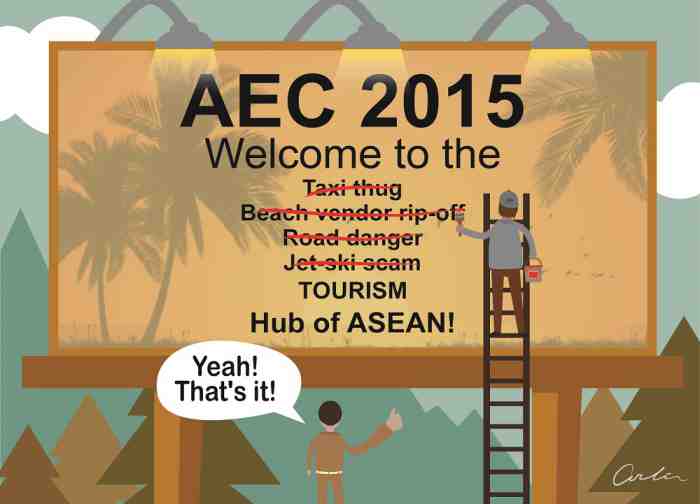Opinion: Phuket’s AEC success hangs in the balance

PHUKET: While the past year brought unprecedented developments in reclaiming public beaches from the hands of corrupt local politicians, the fact remains that the days of Phuket getting by solely on its merits as a beach-tourism destination have gone.
The terms of the Asean Economic Community (AEC) are set to come into effect in 2015, in theory transforming its 10 member states into a single bloc comprising the world’s seventh-largest economy.
It is hard to discern the reality from the hype, but to many alert onlookers, the AEC is just another manifestation of a trend toward regional economic integration that started decades ago. Few parts of Southeast Asia have been more greatly affected than Phuket, which has already proclaimed itself as the “Tourism Hub of Asean”.
The past year has clearly demonstrated that the trend here is one of increasing urbanization as the island consolidates its position as an important domestic and regional hub for retail commerce, in addition to its unrivalled array of tourism options.
Under the heavy yoke of the island’s criminal transport syndicates for years, it was if the entire economy was being driven with its handbrake on; with the cost of reaching attractions making the cost prohibitive for many tourists.
With the “thug factor” now hopefully eliminated, 2015 should see a large increase in new public transport options, like last year’s launch of the Airport Bus service to Patong, rather than more road projects that risk transforming our landscape into an island replica of the traffic chaos in Bangkok.
While the ousted government of former premier Yingluck Shinawatra snuffed out previously-approved funding to build a world-class convention center in Phuket in 2012, the island’s hosting of the Asian Beach Games in November demonstrated that it still has the collective resources to successfully host major international events – even under martial law.
Another major development announced for the island in the past year was that The Mall Group is set to invest 20 billion baht for the development of the 150-rai BluPearl mega-project in Kathu.
Regional integration will no doubt expand well beyond the borders of the 10 Asean states, as indicated by the recent agreement between the Thai and Chinese premiers to embark on a US$10.6bn (350mn baht) investment for high-speed railways linking the two countries.
Already well established as a regional aviation hub, Phuket is well situated to take advantage of improved regional transport under any Asean “open skies” agreement. But the most important key to moving forward must be to ensure that all future development – public and private – is carried out in a way that protects what is left of the natural environment that established Phuket as a prime destination in the first place.
Latest Thailand News
Follow The Thaiger on Google News:


























